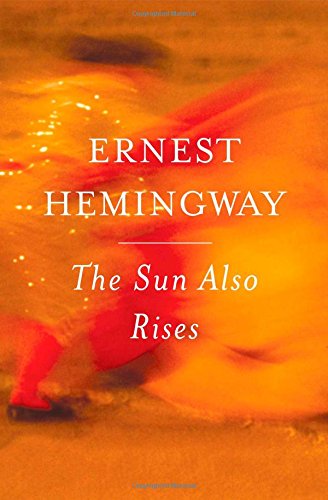All Nonfiction
- Bullying
- Books
- Academic
- Author Interviews
- Celebrity interviews
- College Articles
- College Essays
- Educator of the Year
- Heroes
- Interviews
- Memoir
- Personal Experience
- Sports
- Travel & Culture
All Opinions
- Bullying
- Current Events / Politics
- Discrimination
- Drugs / Alcohol / Smoking
- Entertainment / Celebrities
- Environment
- Love / Relationships
- Movies / Music / TV
- Pop Culture / Trends
- School / College
- Social Issues / Civics
- Spirituality / Religion
- Sports / Hobbies
All Hot Topics
- Bullying
- Community Service
- Environment
- Health
- Letters to the Editor
- Pride & Prejudice
- What Matters
- Back
Summer Guide
- Program Links
- Program Reviews
- Back
College Guide
- College Links
- College Reviews
- College Essays
- College Articles
- Back
The Sun Also Rises by Ernest Hemingway
Jake Barnes is an American writer who comes out of WWI in need of a quieter life. He takes to his coffee-shop expatriates, and moves to Paris. And vacationing together, they then take to Spain to watch the bull-fights in San Sebastian and its wild summer fiesta.
Despite the fact Hemingway was apparently an “abusive, alcoholic misogynist who squandered half his life, hanging around Picasso trying to nail his leftovers” according to Katarina Stratford, The Sun Also Rises has been crowned a classic in the literary genre since publication. Nonetheless, I couldn’t help wondering what the big idea was until I’d finished the book. Subtlety isn’t new in the archetypal genre, but soon I began to wonder if there was one at all.
But it’s hard to immediately put the book down. Classics tend to shine for a reason, and Hemingway’s pen is brisk and easy gliding through the sun-tinted settings of la ville lumière and España. The characters he describes are tragically believable, hung up with all the romanticized dirty laundry of a late-night write. Main character Barnes handles considerable world-weariness, and the novel points to the silliness of a self-convinced world.
But it’s little to compensate the topics Hemingway tosses away with equal ease; misogynic attitudes, anti-Semitism, and general drunkenness make casual appearance within a book that seems to exist only for the sake of time passing. There were little circumstances requiring of such good narration, as we follow Barnes about his fishing, his eating, his talkings, his drinking, and very occasional sentiments about himself. And the magnificent “bull-fights” the novel is famed for only make cameo somewhere in the last fourth of the book.
True, Hemingway supposedly writes for the “lost generation,” which from the First World War millions of youths returned home disillusioned and desolate. That inference attempts to explain much, though the Great War is hardly referenced in the novel. All the same, I have yet to find out why the sun also rises.
Similar Articles
JOIN THE DISCUSSION
This article has 0 comments.

What does "THHRe" stand for? Good question! It's THE HOLY HITCHHIKE’S REVIEW...A shorter version of the Hitchhike, reviews principally concerning books, movies, and music. Enjoy, and let loose your commentary and suggestions below. A new column of THH every Friday!